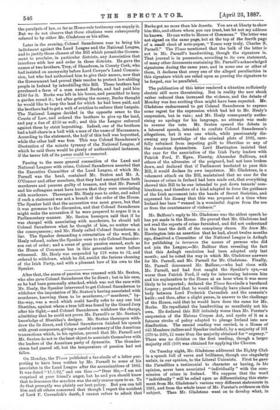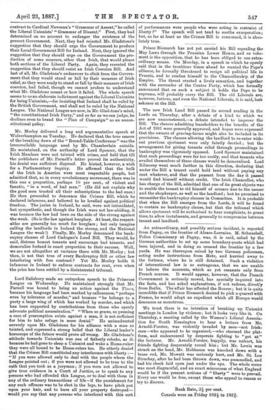On Tuesday night, Mr. Gladstone addressed the Eighty Club in
a speech full of verve and brilliance, though one singularly unfair, in our opinion, to the Liberal Unionists. First he gave the Pamellites a testimonial to character as having, in his opinion, never been associated "individually" with the com- mission of crime in Ireland. We suppose that the word "individually" will be relied upon as differentiating this state- ment from Mr. Gladstone's various very different statements in 1881, and from the whole tenor of Mr. Forster's evidence on this subject. Then Mr. Gladstone went on to develop what, in contrast to Cardinal Newman's "Grammar of Assent," he called the Liberal Unionists' "Grammar of Dissent." First, they had determined on no account to endanger the existence of the present Government. Next, they had rejected Mr. Gladstone's suggestion that they should urge the Government to produce their Local Government Bill for Ireland. Next, they ignored the suggestion that they should urge on the Government the pro- duction of some measure, other than Irish, that would please both sections of the Liberal Party. Again, they resented the suggestion that they should resist an Irish Coercion Bill. And last of all, Mr. Gladstone's endeavour to elicit from the Govern- ment that they would stand or fall by their measure of Irish relief, as they were ready to stand or fall by their measure of Irish coercion, had failed, though we cannot profess to understand what Mr. Gladstone meant or how it failed. The whole speech -seems to ns an elaborate indictment against the Liberal Unionists for being Unionists,—for insisting that Ireland shall be ruled by the British Government, and shall not be ruled by the National -League. The National League are now, in Mr. Gladstone's mind, " the constitutional Irish Party," and so far as we can judge, he -declines even to brand the "Plan of Campaign" as an amen- ertitutional policy.



































 Previous page
Previous page